- Home
- Vicki Delany
Elementary, She Read: A Sherlock Holmes Bookshop Mystery
Elementary, She Read: A Sherlock Holmes Bookshop Mystery Read online
Also Available by Vicki Delany
Year Round Christmas Mysteries
We Wish You a Murderous Christmas
Rest Ye Murdered Gentlemen
Lighthouse Library Mysteries (as Eva Gates)
Reading Up a Storm
Booked for Trouble
By Book or By Crook
Constable Molly Smith Mysteries
Unreasonable Doubt
Under Cold Stone
A Cold White Sun
Among the Departed
Negative Image
Winter of Secrets
Valley of the Lost
In the Shadow of the Glacier
Klondike Gold Rush Mysteries
Gold Web
Gold Mountain
Gold Fever
Gold Digger
Fiction
More than Sorrow
Burden of Memory
Scare the Light Away
Elementary, She Read
A SHERLOCK HOLMES BOOKSHOP MYSTERY
Vicki Delany
NEW YORK
This is a work of fiction. All of the names, characters, organizations, places, and events portrayed in this novel are either products of the author’s imagination or used fictitiously. Any resemblance to real or actual events, locales, or persons, living or dead, is entirely coincidental.
Copyright © 2017 by Vicki Delany.
All rights reserved.
Published in the United States by Crooked Lane Books, an imprint of The Quick Brown Fox & Company LLC.
Crooked Lane Books and its logo are trademarks of The Quick Brown Fox & Company LLC.
Library of Congress Catalog-in-Publication data available upon request.
ISBN (hardcover): 978-1-68331-096-9
ISBN (ePub): 978-1-68331-097-6
ISBN (Kindle): 978-1-68331-098-3
ISBN (ePDF): 978-1-68331-099-0
Cover design by Louis Malcangi.
Cover illustration by Joe Burleson.
www.crookedlanebooks.com
Crooked Lane Books
34 West 27th St., 10th Floor
New York, NY 10001
First Edition: March 2017
To Mom
Contents
Chapter 1
Chapter 2
Chapter 3
Chapter 4
Chapter 5
Chapter 6
Chapter 7
Chapter 8
Chapter 9
Chapter 10
Chapter 11
Chapter 12
Chapter 13
Chapter 14
Chapter 15
Chapter 16
Chapter 17
Chapter 18
Chapter 19
Chapter 20
Chapter 21
Acknowledgments
Chapter 1
The Great Detective eyed me.
I eyed him back. “Don’t give me any of your cheek, you.” I gave him a swipe across his exceedingly prominent nose with the feather duster.
“Talking to him again, Gemma?” said a voice behind me. “You know what they say about conversing with inanimate objects.”
“He does give me the creeps, this one,” I said. “He always seems to be watching me. And not in an approving way.” The clay bust of Christopher Lee as Sherlock Holmes got another pass with the duster before I turned to greet the new arrival.
Jayne Wilson struggled to get through the shop door carrying a large box. With a grateful sigh, she dropped the box onto the table in the center of the room. “Scored! Big time.”
My sigh wasn’t so grateful. “Not more junk.”
“How many times do I have to tell you, Gemma? This is not junk. This is valuable memorabilia.”
I put down the feather duster and approached the table. Jayne carefully unfolded the cardboard flaps. Out of a mound of bubble wrap, she extracted a teapot. She shoved aside a stack of books waiting to be shelved and put the pot down. Next came a matching cream pitcher and sugar bowl. She stepped back to admire the new purchases. “Isn’t it perfect?”
“Perfect.” I refrained from adding, “In its hideousness.”
The teapot and accessories were made of quality bone china and in excellent condition. Not so much as a crack or chip that I could see on a quick inspection. The decoration on the pot was of a hook-nosed man in a deerstalker hat peering through a magnifying glass, a pipe clenched firmly in his teeth. The accompanying cream pitcher and sugar bowl were adorned with smaller versions of the hat, pipe, and magnifying glass.
Jayne beamed. “Marg McKenzie found it when she was on vacation in Halifax and got it for us. I paid her back, of course, because I’d asked her to be on the lookout for this sort of thing. It’s for the tea room, not for sale, so hands off, Gemma.”
“How much did it cost?” I ventured to ask.
“Price is no object.”
“Price is always an object,” I replied. “And an excessively large one.”
She didn’t bother to answer the question, thus confirming my suspicions. “My customers adore using this sort of thing. If I can get a few more of them, I’m thinking of putting specialized cream teas on the menu. ‘The Sherlock Special.’ ‘Irene Adler’s Tea Party.’ That sort of thing.”
“Holmes never had a cream tea,” I said.
“A minor point. If he wasn’t so busy dashing around London or heading off to the ‘smiling and beautiful countryside,’ he would have. I bet Watson’s wife made him a proper afternoon tea all the time. When he wasn’t helping Sherlock, that is.” She began repacking the items. “Haven’t you got dusting to do or something?”
“I always have dusting to do. I never seem to stop dusting.”
“Cheerio!” she said, heading for the door connecting my shop to the tea room next door. I watched her go with a smile. The word that best describes my friend is petite. The second best would be pretty. She has shiny blonde hair, bright-blue eyes, a wide mouth containing perfect teeth, a pointed chin, and a heart-shaped face. She is short and fine-boned and works hard at keeping herself in good shape. She comes up to my shoulder. I am not small, blonde, or delicate, and I have always felt like an awkward lump standing next to Jayne. I love her dearly.
Jayne also likes to pretend she’s English. I am English, but after more than five years in Massachusetts, even I don’t say things like “Cheerio!” anymore. Not that I ever did.
I went back to my dusting. There’s always a lot of dusting in a shop like this one. I am the half owner, manager, head shop clerk, and chief duster of the Sherlock Holmes Bookshop and Emporium in the Cape Cod town of West London, Massachusetts. As well as reprints of the original Sir Arthur Conan Doyle books, we carry new books representing anything and everything in the pastiche or vaguely derived from the Holmes legend. From Laurie R. King’s Mary Russell (a.k.a. Mrs. Holmes) mystery series to The Curious Incident of the Dog in the Nighttime to Holmes for the Holidays and all the myriad short story collections inspired by the canon. At the moment, I have a first edition of The Sign of the Four for sale, but it’s not worth much because of its condition. I suspect that at one time a mouse attempted to use some of the pages for her nest. I bought it for a pittance, carefully wrapped it in plastic, and stuck on a tag showing a minimal price as well as one explaining its condition. Someday, someone will buy it. I can still be surprised at what a dedicated follower of Sherlock will consider a treasure. Once in a while my uncle Arthur will locate original books in reasonable condition, as well as copies of the Strand Magazine, in which many of the stories first appeared, but we don’t deal in rare and valuable editions. That’s not our b
usiness.
Because not everyone (certainly not me!) wants to read about Holmes all the time, one wall of shelves is labeled “gaslight” and features novels or anthologies, mysteries mostly, set in the late Victorian or early Edwardian period. Another shelf is for nonfiction, including biographies of writers of the age, anyone and everyone Sir Arthur Conan Doyle might have bumped into in his travels, as well as histories of the times in which Sir Arthur lived.
Books are my first (and, I sometimes think, my only) love, and my intention when I came to America to take over Great Uncle Arthur’s business was to continue to run this place as a bookstore featuring Conan Doyle, his contemporaries, and modern books influenced by them. But I quickly came to realize that these days, as everyone knows, Sherlock Holmes is far more than books, so we branched out into all forms of Sherlockania. I have tried to keep our stock dignified, but what I call “junk” and Jayne calls “memorabilia” began creeping onto the shelves as of day one.
The shop now sells movie posters; DVDs of the movies; collectables, such as the aforementioned bust of Christopher Lee; and even mugs, towels, and dishcloths. First thing this morning, only a few minutes before I started dusting, I unloaded—I mean, sold—a life-sized stand-up cutout of Benedict Cumberbatch as Sherlock along with a full-color illustrated book on the making of the contemporary BBC series.
As well as the Bookshop and Emporium, Uncle Arthur and I own half of the business next door. Jayne owns the other half and runs the place. We call it Mrs. Hudson’s Tea Room.
The bell over the door tinkled, and I glanced toward it. Then I glanced again.
The man standing there was definitely worth a second look. He was tall and lean, with deep-brown eyes, a strong jaw showing a hint of stubble, chiseled cheekbones, and a mass of brown hair curling around his ears in the damp sea air. He wore Italian loafers, khaki Dockers, and a blue-checked shirt with the top two buttons undone. His clothes were clean but not new, and the trousers could have done with the touch of an iron. He gave me a smile that practically lit up the room.
“Hi,” I croaked. “I mean, welcome. If I can help you with anything, let me know.”
“Thanks,” he said. “Nice cat.”
The creature to which he was referring was Moriarty, the shop cat. Moriarty had roused himself from his morning nap and was rubbing himself against the man’s legs.
“Uh,” I said.
The man gave Moriarty a pat on the head and then straightened up again. The cat meowed for more attention. “Quite the place you have here.”
“We’re all Sherlock, all the time.”
“You’re from England, right?”
I nodded.
“The heart of London, I detect.”
“You have a good ear.” Most Americans can’t distinguish one regional English accent from another. Or even Scottish from Irish or Welsh from English.
“I’ve spent quite a lot of time in the UK,” he said. I smiled, but I didn’t reply that I could tell. I also have a good ear. His accent told me he was from Boston, educated at a private school or a very good public one, and his education had been completed in England. He wandered around the shop, followed closely by Moriarty. When the man stopped to examine the shelf containing games and puzzles, the cat jumped up. Moriarty almost smiled; I didn’t know he could do that. The man scratched behind the feline’s ear. Moriarty purred. He was small and thin, despite the prodigious quantities of kibble he consumed, and pure black except for his amber eyes. “Friendly little guy. What’s his name?”
“Moriarty.”
He laughed. That is, the man laughed, not the cat.
“Let me know if I can help you with anything.” I returned to my dusting. The man spent a couple of minutes idly looking at the Holmes and Watson chamber pot (which I suggest using as a planter), leafing through the movie posters, and examining the DVD collection. It was obvious by the way he barely looked at the objects he was pretending to be interested in that tasteless chamber pots and movie memorabilia were not the reason for his visit. His eyes wandered constantly to the bookshelves. The Holmes shelves, not the gaslight or nonfiction.
Eventually, he oh-so-casually drifted over.
“Are you looking for anything in particular?” I asked.
“Nope. Just browsing.” He picked up the first-edition The Sign of the Four. “Too bad this is damaged.”
“It’s a tragedy. But I get new stock in all the time. Occasionally, I have some second edition books in moderately good condition.”
“Is that so,” he said, moving on to the bound collections of the Strand Magazine.
“I can take your name if you like. Keep you posted if I hear of anything.”
He turned to face me. That smile again. “Good idea.”
“I do a mail-order business, too,” I said. I wasn’t digging to find out where he lived. Really, I wasn’t. I didn’t know anything about him other than he was a native New Englander, had enjoyed a comfortable childhood, was educated at an Ivy League college, had spent several years in the UK (probably around Oxford, as either a postgraduate student or junior professor), and was not here as a casual tourist. He was not wealthy but not struggling either. And unlikely to be married.
“I’ve recently moved to West London,” he said.
“Welcome,” I said. It was a mild spring day, and earlier a strong breeze had been blowing in from the ocean. But the temperature in the shop was climbing rapidly.
“What came first?” he asked. “The store or the address?”
“They do go together, don’t they? This was formerly a hardware store, but my great uncle bought it for the address. 222 Baker Street, West London, New England.”
He smiled. I felt myself smiling back. I momentarily forgot myself and extended my hand to stroke Moriarty.
In return the cat hissed and scratched my left arm. It hurt.
Uncle Arthur had found the starving, abandoned kitten in the alley behind the shop two years ago and lured him in with a dish of cream and sweet words. Moriarty’s lived here ever since. He’s a great shop cat; everyone loves him, and he loves everyone in return.
Everyone except me. I try not to take it personally. Other animals seem to like me just fine. Maybe he misses Uncle Arthur and blames me for taking his place. Still, I keep trying to make nice.
“I’m Grant, by the way. Grant Thompson.” He held out his hand.
I took it in mine and we shook. “Gemma Doyle.”
“Doyle?”
“A distant relation, or so my family says.”
“There’s a story there,” he said with a grin. “And I’m going to hear it one day. But for now, here’s my card.” He handed me a small square of stiff cream paper. “Is the place next door strictly a tea room? I haven’t had lunch yet, but I’m not much of a tea person.”
“Surely at Oxford you got accustomed to tea?” I said. Was I flirting? Why, I think I might have been.
“How did you know I went to Oxford?”
I waved my hand in the air. “You picked up a trace of an accent.” That, plus an educated guess on my part; he might have gone to Cambridge.
“You’re very observant, Gemma Doyle.”
“Am I? I don’t think so.”
“I did my PhD at Oxford, yes. Never did care for tea, but I learned to love a good British pub.”
“Mrs. Hudson’s specializes in cream teas and afternoon teas,” I said. “But we do sandwiches and salads for lunch, and good old American muffins and bagels in the morning. Coffee, lattes, and cappuccinos too.”
“I might give it a try then. Catch you later, Gemma.”
Moriarty jumped off the counter. Tail high, he followed Grant to the door that led to the tea room. He was, of course, forbidden from going where food was served, and so he sat by the door gazing wistfully inside. He was small in size but gigantic in personality.
I wiped a drop of blood off the cat scratch on my arm. Then I flipped the card over. “Grant Thompson. Rare book collector.” No street address
, just an e-mail and phone number.
A hiss caught my attention. Jayne, dressed in a long white apron over a black T-shirt and denim capris, stood in the doorway. She pointed behind her to the restaurant, opened her eyes and mouth wide, and waved her hand as though it were on fire. Trust Jayne to notice every handsome man that came into her tea room.
Business was brisk for most of the day. It was the beginning of the tourist season on Cape Cod, and we’d placed ads in the visitors’ brochures. Many of the mugs and toys moved, mostly the cheap stuff that appealed to laughing groups of college kids or parents with small children. In season, I always keep a good stock of paperbacks for beach and pool reading, and as the forecast for tomorrow said it would rain, the DVDs sold well too.
I kept half an eye on the tea room, and although Grant Thompson didn’t appear again, I was pleased to see a steady stream of customers coming in for lunch and, later, to enjoy afternoon tea.
At twenty-two minutes to four every day, I go to Mrs. Hudson’s for a much-needed tea break. Today, as I was alone in the shop, I hung a “Back in 15 Minutes” sign on the front door. The phone underneath the sales counter began to ring, but I didn’t go back for it; voice mail would pick it up.
The tea room closes at four, and by this time it’s normally almost empty. Jayne had done a great job decorating the place. The walls were papered in soft shades of sage green and peach, with white wainscoting. A portrait of Queen Elizabeth II was prominently hung on the back wall, among paintings of castles and thatched-roof cottages nestled in verdant pastoral landscapes. The wall adjoining the Emporium consisted of open shelves displaying row upon row of bone china teacups and teapots, while a multitude of jars of loose teas and locally made jams and preserves filled the space next to the swinging half door leading into the kitchen area.
I settled myself at my favorite table, a small one tucked into the window alcove. A bench seat was under the window, padded in soft fabric that matched the color of the walls, with two white-painted chairs opposite. A tiny white vase, containing a sprig of greenery and a single fresh flower, sat in the middle of the table. Fiona appeared, dressed in the tea room’s waitress uniform: a knee-length black dress, black stockings, and a white apron with the Mrs. Hudson’s Tea Room logo on it—a steaming teacup next to a pipe. She brought my drink in the new Sherlock Holmes pot.

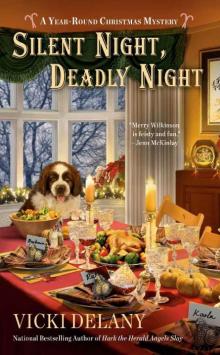 Silent Night, Deadly Night
Silent Night, Deadly Night Coral Reef Views
Coral Reef Views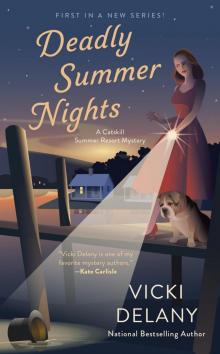 Deadly Summer Nights
Deadly Summer Nights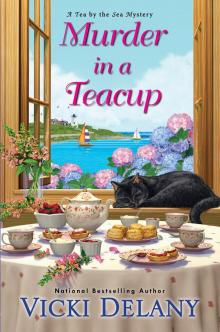 Murder in a Teacup
Murder in a Teacup Whiteout
Whiteout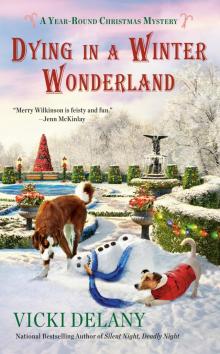 Dying in a Winter Wonderland
Dying in a Winter Wonderland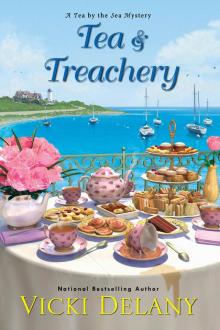 Tea & Treachery
Tea & Treachery Rest Ye Murdered Gentlemen
Rest Ye Murdered Gentlemen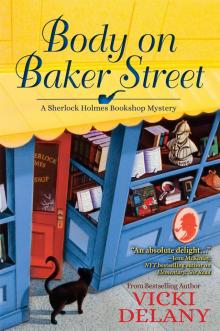 Body on Baker Street: A Sherlock Holmes Bookshop Mystery
Body on Baker Street: A Sherlock Holmes Bookshop Mystery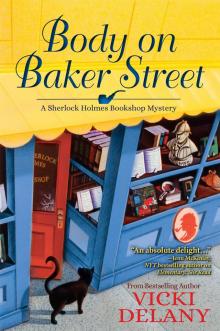 Body on Baker Street
Body on Baker Street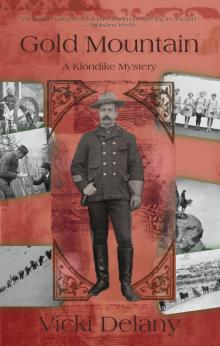 Gold Mountain
Gold Mountain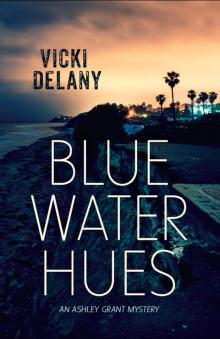 Blue Water Hues
Blue Water Hues Hark the Herald Angels Slay
Hark the Herald Angels Slay Murder at Lost Dog Lake
Murder at Lost Dog Lake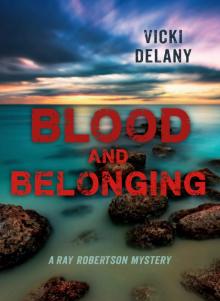 Blood and Belonging
Blood and Belonging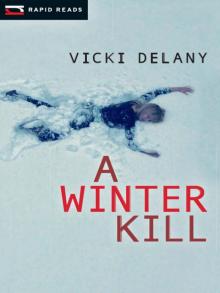 A Winter Kill
A Winter Kill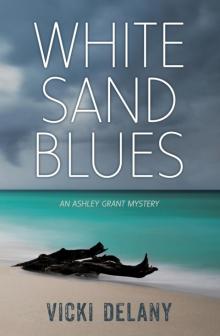 White Sand Blues
White Sand Blues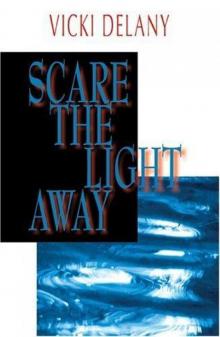 Scare the Light Away
Scare the Light Away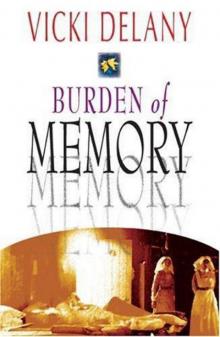 Burden of Memory
Burden of Memory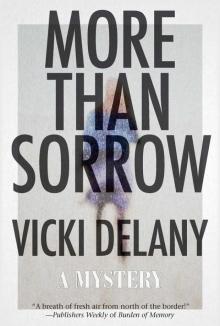 More Than Sorrow
More Than Sorrow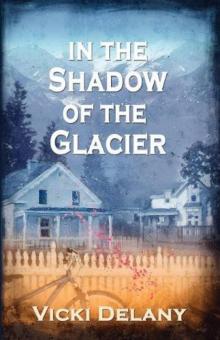 In the Shadow of the Glacier
In the Shadow of the Glacier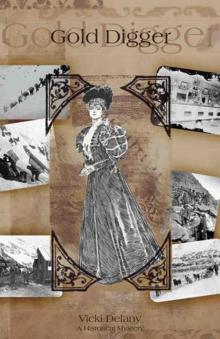 Gold Digger: A Klondike Mystery
Gold Digger: A Klondike Mystery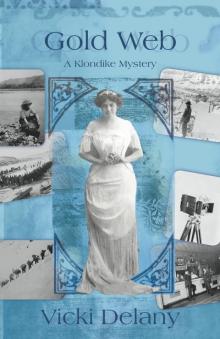 Gold Web
Gold Web Haitian Graves
Haitian Graves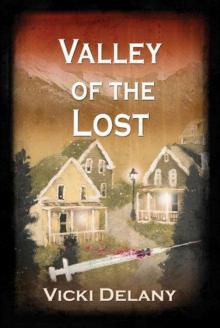 Valley of the Lost
Valley of the Lost We Wish You a Murderous Christmas
We Wish You a Murderous Christmas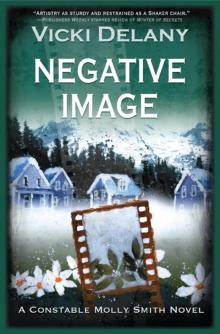 Negative Image
Negative Image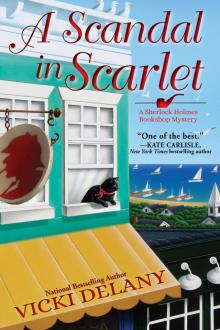 A Scandal in Scarlet
A Scandal in Scarlet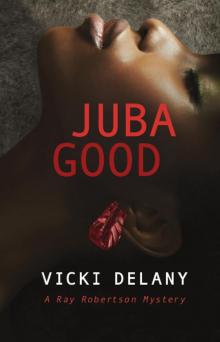 Juba Good
Juba Good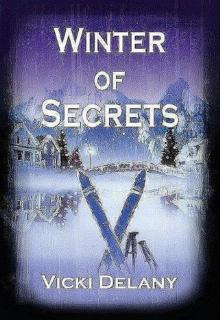 Winter of Secrets
Winter of Secrets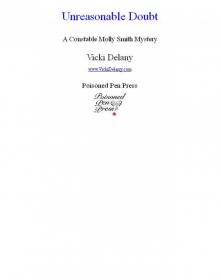 Unreasonable Doubt
Unreasonable Doubt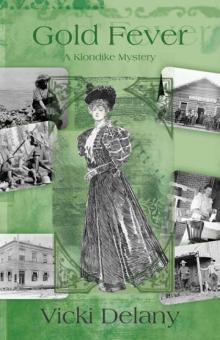 Gold Fever
Gold Fever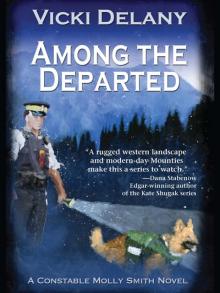 Among the Departed
Among the Departed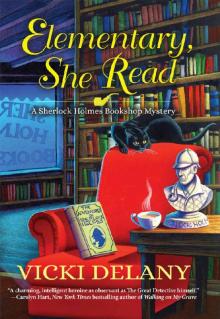 Elementary, She Read: A Sherlock Holmes Bookshop Mystery
Elementary, She Read: A Sherlock Holmes Bookshop Mystery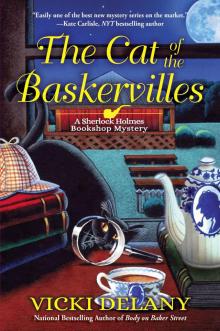 The Cat of the Baskervilles
The Cat of the Baskervilles